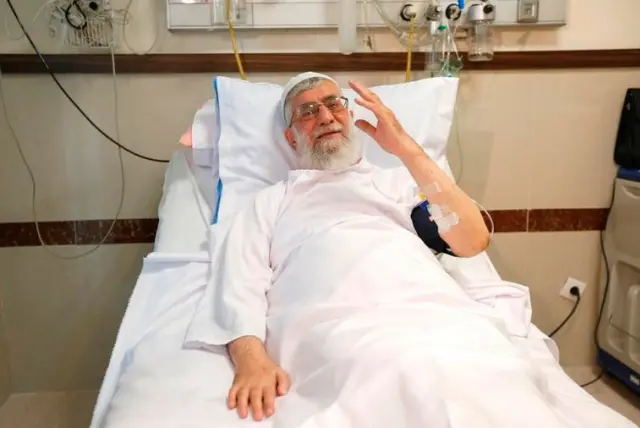PDF Version
Farsi Translation (ترجمه فارسی)
The Iranian regime’s power structure has evolved much after 43 years of power struggle among various factions and now it goes well beyond any single individual. So far, the only institution that has successfully established its stronghold over Iran’s Economy, Politics and Army is Iran’s Islamic Revolutionary Guard Corps (IRGC) along with its infamous terrorist organization, the Quds Force, its extraterritorial operations arm.
If Iran’s current leader Khamenei is to die today, the IRGC has ensured that there are no more individuals such as Ayatollah Ali Khamenei or Akbar Hashemi Rafsanjani to wield any significant political power or to designate the next supreme leader as it happened when Ayatollah Khomeini, Iran’s first supreme leader died in 1989. On Khomeini’s death, Rafsanjani one of the founders of the Islamic Republic and the former President made Khamenei the next leader, and recently even Rafsanjani got drowned allegedly by IRGC or Iranian Intelligence apparatus working under IRGC.
When Iran’s first supreme leader died, Iran’s terrorist designated Islamic Revolutionary Guard Corps (IRGC) barely had any influence over government institutions, but 30 years later, IRGC successfully managed to engineer the appointment of Ebrahim Raisi as Iran’s president. This appointment was also seen as a soft military coup inside and outside Iran. Several strong candidates competing with Ebrahim Raisi were brutally eliminated by Iran’s powerful Guardian Council, where its members are vetted and appointed by Ayatollah Khamenei. But its verdict, in this case, was dictated by IRGC with the approval of Ayatollah Khamenei. Dr. Ali Larijani, the former Conservative Speaker of Iran’s Parliament and former Secretary of Supreme National Security Council, and Dr. Masoud Pezeshkian, the former Deputy Speaker of the Parliament, a current member of Parliament and former Minister of Health, were among several powerful conservatives and reformists who were eliminated by Guardian Council on the orders of IRGC. During the presidential debates, it was also revealed and exposed for the very first time that Ebrahim Raisi had only six-grade education. Perhaps this is the reason that has become a butt of jokes for making enormous blunders whenever he gives any speech. Some of his recent blunders were using “Locomoteer” instead of “Locomotive”, “Propakani” instead of “Propaganda”, and he even uttered the word “Anguzman”, a word that doesn’t even exist in the Farsi language. In Iran, basic English language is offered after 6th grade.
At Present, IRGC is behind every decision made by the executive branch and with precise planning; it seeks to extend absolute control over other governmental organizations in every province, city, and village across the country. Its members are now in charge of the most powerful ministries such as the Foreign Ministry, Interior Ministry, Defence Ministry, and Ministry of Roads and Urban Development, etc. Basically, wherever there is money and power, IRGC is there. In fact, Raisi’s Interior Minister, Ahmad Vahidi is wanted by Interpol since 2007 for his alleged participation in the bombing of a Jewish community center in Buenos Aires, Argentina on 18 July 1994 in which 85 people died. Most of Raisi’s cabinet members are also IRGC members. After the recently announced 3-billion-dollar IRGC contract, even the cultivation of rice will be controlled by the IRGC. In other words, the daily needs of the people will be in complete control of the IRGC terrorist organization.
There is no doubt that this is only the beginning after Ebrahim Raisi’s appointment, and it is quite evident that soon IRGC will take full control of the cultivation of wheat, fruits, and every profitable commodity that will give them control over people’s life. This, combined with the Iran-China 25-year-deal signed last year, increases the likelihood that IRGC will completely hand over Iran’s agricultural sector to China in order to maximize its profits without troubling itself. The IRGC is also set to seize all gold, copper, zinc, iron, and rare mineral mines, and will gradually seize the few remaining private and public mines. The ulterior motive behind all this is to prevent any private or public entity from having independent income and to ensure that the entire nation is fully dependent on IRGC’s established monopoly. Currently, the President, the chairman of Guardian Council, the chairman of Expediency Council, and the head of Judiciary, all are in service of the Revolutionary Guards. Other important organizations and powerhouses and even all governorates and municipalities across the nation are under complete control of IRGC. It also includes the Islamic Consultative Assembly, headed by Mohammad Bagher Ghalibaf, a corrupt high-ranking IRGC Commander, who is also the current Speaker of the Parliament of Iran. IRGC’s other strategy to bolster its dictatorial rule is the deployment of religious clerics across the nation to take advantage of people’s personal beliefs for further controlling them.
Nearly six months ago, in an editorial on the so-called presidential victory of Ebrahim Raisi, the New York Times mentioned the names of figures that were seen and heard for the first time along with Ebrahim Raisi. The New York Times editor-in-chief noted in the article that although the Islamic Republic is a full-fledged dictatorship, Ayatollah Khamenei is certainly not all that is there to it. In fact, the model of the government of the Islamic Republic has now become a phenomenon in which, even the great dictator himself, is now merely a cog in the machine. This system has evolved enough to withstand Khamenei’s death without a flinch. Although the IRGC is often perceived as a tool for Ali Khamenei to preserve his power, in fact, it is the Revolutionary Guards who are the kingmakers in the Islamic Republic’s dictatorship; and without the limitation of centralized power among a few individuals, they have the ability to give birth to a new dictator and replace him at their own will.
Also read: Iranian Citizens Bearing The Cost of Religious Institutions in Syria

